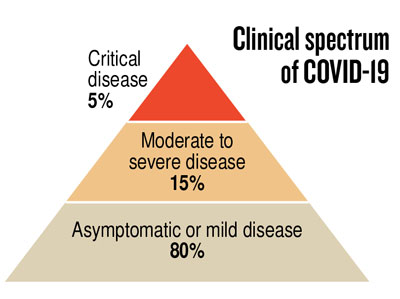News
A reminder to the public: Essentials of COVID-19
View(s):Re-visiting the essentials of COVID-19 for the public, Specialist Physician in General Medicine Prof. Chamila Mettananda says that it is a viral infection like the flu. The disease spreads mainly by respiratory droplets and rarely through airborne transmission. The incubation period of this virus is 1 to 14 days but mostly 4-5 days.
 “The severity of the disease can vary from no-symptoms, mild symptoms to severe symptoms depending on how the body reacts to the disease like any other viral infection. Eighty percent of the patients who get the disease will be asymptomatic or mildly symptomatic. Only 5% will develop critical disease and the rest (15%) will have moderate to severe disease,” she says.
“The severity of the disease can vary from no-symptoms, mild symptoms to severe symptoms depending on how the body reacts to the disease like any other viral infection. Eighty percent of the patients who get the disease will be asymptomatic or mildly symptomatic. Only 5% will develop critical disease and the rest (15%) will have moderate to severe disease,” she says.
Prof. Mettananda who is attached to the Faculty of Medicine, University of Kelaniya, explains that the symptoms of COVID-19 infection could be like any other viral upper respiratory tract infection – mild fever, body aches, sore throat and runny nose.
“Only 15-20% will develop symptoms of pneumonia like high fever and shortness of breath. There is no specific treatment for the patients with mild disease and specific treatment is initiated only for moderate-severe and critical disease. Therefore, the majority of the patients can be managed in the community without being admitted to hospital,” she assures.
While pointing out that this would prevent the unnecessary burdening of hospitals and allow doctors to pay more attention to needy patients, Prof. Mettananda, however, stresses that people with chronic medical problems and those with impaired immunity are at risk of severe disease. They need to get medical advice early and be monitored carefully, but it may not mean that it would lead to hospital admission in all cases.
This category includes: those older than 60 years of age; patients with other chronic illnesses like poorly controlled diabetes mellitus or chronic kidney, liver, lung or heart disease; patients with low immunity including those with cancer, organ transplant recipients and those on immuno-suppressants; and expectant mothers.
Her advice to those who test positive but can be at home is:
· Self-isolate for 2 weeks; both from society as well as from other family members. However, if you do not have a place to self-isolate, you should contact the relevant Public Health Inspector (PHI) and go to an intermediate care centre (ICC) and not to a hospital.
- Maintain good hydration and nutrition.
- Take physical rest without exerting yourself.
- Take paracetamol 6 hourly if you have fever.
- Have good psychological support by maintaining social relationships over the phone even though you are self-isolating. This will hasten your recovery.
These are the signs which would give you an early danger signal that you are progressing from moderate to severe disease, says Prof. Mettananda:
- If you are breathless while resting or with mild exertion
- If you have high fever even after 3 days
- If you are unable to eat or drink or have generalized debility
- If you detect your oxygen saturation to be less than 94% at rest
“If these symptoms or signs are observed, go to a COVID treatment centre/hospital,” she says, adding that it is also important to remember that not seeking medical advice or not getting admitted to hospital on a doctor’s instruction for any other illness due to fear of contracting COVID-19 at the hospital may cause a lot of harm.
Echoing the pleas of medical experts, Prof. Mettananda says: Wear the mask properly; maintain hand hygiene; avoid unnecessary travel; and maintain social distancing.
“Getting fully vaccinated is very important, as this is the only protection against severe disease. There is no drug to prevent the progression from moderate to severe disease,” she adds.

